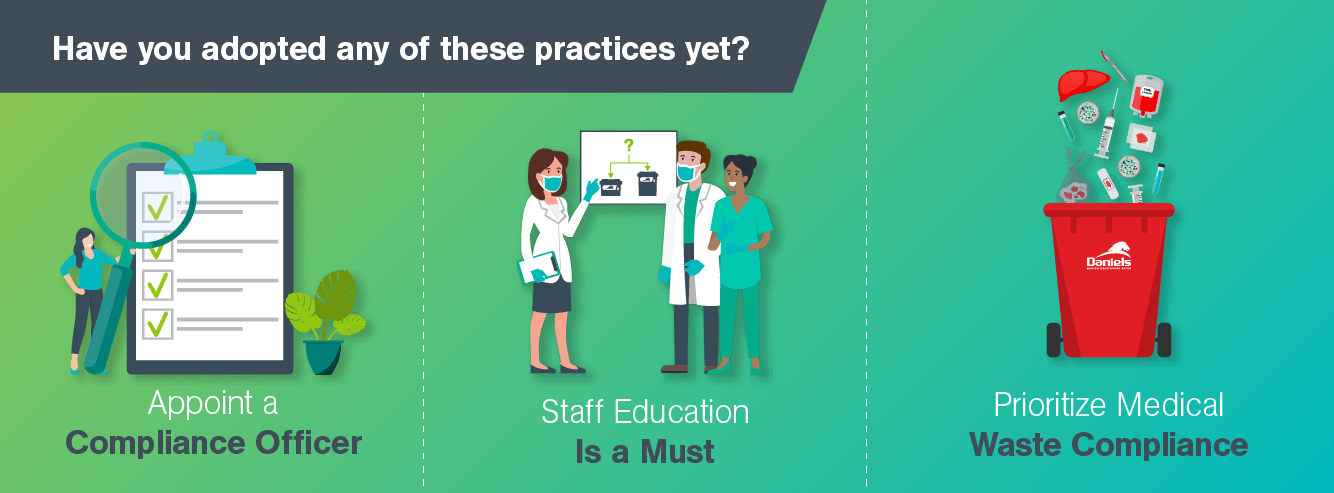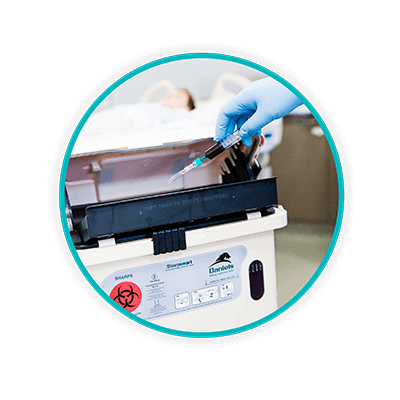Best Practices To Promote Regulatory Compliance at Your Hospital

Actively working toward promoting compliance is one of the best ways to help promote safety while preventing an increase in costs. Hospital compliance programs can help to avoid missteps that may result in expensive and cumbersome investigations and penalties from regulators and lead to reduced patient satisfaction, even for those that are not required to adopt one.
Active compliance programs are critical to guaranteeing effective and consistent care. Additionally, they ensure compliance with local, state, and federal requirements, as well as identify opportunities for improvement. With that in mind, here are a few tips and best practices to promote compliance at your hospital.
TOPICS WE WILL COVER:
1 / Appoint a Compliance Officer
2 / Develop Written Policies and Procedures
5 / Prioritize Medical Waste Compliance
Appoint a Compliance Officer
Appointing an individual who is responsible for overseeing compliance can go a long way to helping to ensure operations are in line with all legal and ethical requirements. Such a leader can help to identify areas of non-compliance and spearhead efforts to support compliance and monitor outcomes.
Compliance is something that must be embraced throughout the organization. As a result, it is a good practice in larger organizations for the compliance officer to work with a committee representing facilities and departments across the hospital. For example, a compliance officer might work with medical billing, health information management, and clinical experts, among others.
It is crucial for such a compliance committee to meet regularly. This committee should perform internal audits and work with the compliance officer to identify weaknesses and develop action plans to improve. This will help to ensure that improving compliance is an active effort and that opportunities for improvement are seized.

Develop Written Policies and Procedures
Written policies and procedures are crucial to establishing consistent compliance. These can be laid out in a formal document, such as a compliance handbook. These policies and procedures should set out standards of conduct in all risk areas and should be made readily available to all staff members.
These standards should act as an outline for the entire organization's approach to compliance. They should include detailed regulations that establish expectations for both staff and leadership alike. This both gives staff and leadership the information they need to help remain compliant and provides compliance officers and committees a framework for performing audits and implementing best practices.
Put Patient Privacy First
Patient privacy is a strong area of concern for compliance in every healthcare facility, regardless of size. It is crucial to ensure the facility has a detailed privacy policy that applies to the entire facility. The policy should cover practices from adopting quiet tones when communicating sensitive information to ensuring communications via email, voice mail, and physical mail do not contain protected health information. Patients should be made clearly aware of this policy, and it should be applied at all times. This is particularly important to keep in mind as facilities move to adopt more efficient electronic practices in their facilities, such as digital intake forms and tablet-based systems. These systems must have a secure network in order to maintain compliance with government privacy requirements.
A fully digital system can present privacy concerns, but one way to address this is to allow or potentially, in some cases, require patients to fill out intake forms that are provided online before they arrive. However, as important as privacy is in any measure, it should be equally balanced with the need for patients to access their own health information quickly and without restrictions.
Staff Education Is a Must
Staff education is the core of any hospital compliance efforts. Without effective training and education efforts, compliance will be impossible. Your staff needs to be informed not only about what is expected of them in terms of behavior and technical compliance but also about why compliance is necessary and important.
Staff are one of the many stakeholders that have an interest in the effective operation of the organization, and knowing this can help staff to effectively work toward compliance goals. Training should include general training as well as more focused training when appropriate for each employee's role. Resources should also be made available for staff to understand their compliance responsibilities whenever they need a refresher.
Prioritize Medical Waste Compliance
A crucial yet often overlooked aspect of compliance is healthcare waste management. All healthcare facilities are responsible for any medical waste they generate from its creation until it is rendered harmless. Until this occurs, medical waste can pose significant threats to staff and patients, the public, and the environment.
This is why a broad range of federal and state regulations govern medical waste disposal. These include the Occupational Safety and Health Administration (OSHA) and the Environmental Protection Agency (EPA). Violations of these regulations can result in significant fines. For example, OSHA non-compliance can result in penalties of up to $27,000. However, this is far from the greatest damage that non-compliance can result in.
Violations of the Resource Conservation and Recovery Act, which governs the management of hazardous wastes such as certain types of medical waste, may be punishable by up to $70,000 per violation per day. This can quickly add up to potentially millions in penalties.
This, as well as to prevent harm to people and the environment, is why compliance in waste management is absolutely critical. But healthcare providers are rarely capable of properly disposing of medical waste on their own. Therefore, it is important to partner with a trustworthy disposal provider, such as Daniels Health.
Daniels solutions are designed to meet and exceed state and federal safety regulations while both minimizing risk & saving money. The containers are easy for staff to utilize without mishaps. Additionally, Daniels can arrange service and disposal as needed to guarantee compliance. Moreover, Daniels Health pairs the solutions with virtual access to a large database of waste disposal training modules, guides, regulatory info, online training certificates, and more.
Compliance is a key focus for every hospital and should never be an afterthought. Effective compliance is key to avoiding unnecessary liability and penalties and should be prioritized in every department and activity. Efforts should be actively made to ensure compliance with all local, state, and federal regulations. This should cover everything from patient care and privacy to waste disposal.
